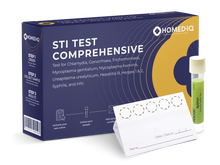Helicobacter pylori: symptoms, diagnosis and treatment
Helicobacter pylori (H. pylori) is a spiral-shaped bacterium that lives in the digestive tract and can infect the stomach lining. While many people with H. pylori never experience symptoms, this infection can lead to serious conditions such as gastritis, ulcers, and in rare cases, stomach cancer.
Table of Contents
- What is Helicobacter pylori?
- Who is at risk for H. pylori infection?
- What symptoms does an H. pylori infection cause?
- Health Risks and Complications
- How is an H. pylori infection diagnosed?
- How is an H. pylori infection treated?
- Can you prevent H. pylori infection?
- Summary
What is Helicobacter pylori?
Helicobacter pylori (H. pylori) is a bacterium that colonizes the stomach lining, where it can survive the acidic environment by producing substances that neutralize stomach acid (National Cancer Institute, 2023). It is extremely common - up to half of the world’s population is infected, often in childhood (Hooi et al., 2017).
Most infections are acquired through oral-oral or fecal-oral transmission, typically via contaminated food, water, or contact with infected individuals (MedlinePlus, 2022). It often spreads within households. In many cases, H. pylori causes no symptoms, and a person may carry the bacterium for years without knowing (National Cancer Institute, 2023).
Who is at risk for H. pylori infection?
H. pylori infections are common and can affect people of all ages, regardless of gender or origin. However, there are certain risk factors that increase the likelihood of infection:
- Geographic location: H. pylori infections are more common in developing countries, which can be attributed to a lack of access to clean water, sanitation, and hygiene.
- Living conditions: People living in crowded housing conditions are more susceptible to H. pylori.
- Socioeconomic status: people with lower socioeconomic status are at increased risk, which may also be attributed to living in crowded conditions or with less access to hygiene.
Source: Mayo Clinic, 2022, Hooi et al, 2017.
What symptoms does an H. pylori infection cause?
Many people infected with H. pylori do not have any symptoms and may have the bacteria for years without knowing it. However, H. pylori can cause inflammation in the stomach lining called gastritis. It can also cause sores or peptic ulcers in the stomach or the first part of the small intestine.
Common symptoms include:
- A burning or gnawing pain in the stomach (especially when hungry)
- Bloating
- Frequent burping
- Loss of appetite
- Nausea
- Unexplained weight loss
If ulcers develop, symptoms may worsen and include vomiting or the presence of blood in stool (which can appear black or tarry).
The symptoms of ulcers or gastritis can look like other health conditions, so it is important to see a doctor to determine the exact cause.
Source: John Hopkins, 2023
Health Risks and Complications
If left untreated, H. pylori infection can increase the risk of:
- Peptic ulcers (stomach and duodenal)
- Gastritis (chronic inflammation of the stomach lining)
- Iron deficiency anemia (due to reduced iron absorption)
- MALT lymphoma (a rare type of stomach cancer)
- Gastric adenocarcinoma (stomach cancer)
Sources: Mayo Clinic, 2022; Suerbaum & Michetti, 2002; National Institute of Cancer, 2023
How is an H. pylori infection diagnosed?
A H. pylori infection can be diagnosed in several ways, including the following tests:
| Test | Description |
| Urea breath test (UBT) | Also known as the urea breath test, this procedure involves providing a breath sample, drinking a urea-containing liquid, and giving a second breath sample a few minutes later. If H. pylori is present, it breaks down the urea and increases carbon dioxide in your breath—indicating a positive result (Cleveland Clinic, 2020). |
| Stool antigen test |
Stool antigen test: The most common stool test, it detects H. pylori antigens in a sample. PCR stool test: A more advanced but costlier method that identifies H. pylori DNA; not widely available (Mayo Clinic, 2022). |
| Blood antibody test | A blood test detects antibodies to H. pylori, but it can’t reliably distinguish between a current and past infection (MedlinePlus, 2021). |
| Gastroscopy (gastroenteroscopy) | If other tests are inconclusive or symptoms suggest ulcers or gastritis, a doctor may perform an upper endoscopy. Using a flexible tube with a camera, the stomach and duodenum are examined for signs of H. pylori-related issues (Mayo Clinic, 2022). |
How is an H. pylori infection treated?
Treatment for H. pylori aims to completely remove the bacterium from the body, thereby reducing the risk of stomach ulcers and other serious complications in the future. Standard treatment, known as eradication therapy, usually involves the simultaneous use of several medications:
- Proton pump inhibitors (PPIs): These medications reduce the amount of stomach acid that is produced. Decreasing acid production in the stomach allows healing of injuries to the stomach lining to occur more quickly.
- Antibiotics: In most cases, at least two different antibiotics are prescribed to treat H. pylori and reduce the chances of antibiotic resistance.
- Bismuth salts (optional): In some cases, a bismuth salt (such as bismuth subsalicylate) may be prescribed. This medication protects the stomach lining from acid.
Treatment for H. pylori is usually given for 10-14 days, and after therapy is completed, a retest may be done at approximately 4 weeks to ensure that the infection has been cleared.
Source: Mayo Clinic, 2022
Can you prevent H. pylori infection?
A healthy stomach and gastrointestinal tract is essential for overall well-being. Here are some practical tips to promote gut health:
- Eat a balanced diet
- Stay hydrated
- Avoid alcohol and smoking
- Regular exercise
- Stress management
- Regular medical checkups
- Practice good hygiene
- Be mindful of medications
Please note that these tips are general advice and are not specific to individual health needs or conditions. It is always advisable to consult a physician before making any changes to your diet, exercise, or medications.
Sources: NHS, 2023; Klein, 2022; Chuang, 2017
Summary
Helicobacter pylori is a common and often silent infection that can lead to serious gastrointestinal conditions if left untreated. Fortunately, it is easily testable and treatable with modern medicine. If you are experiencing unexplained stomach symptoms; or belong to a risk group; consider getting tested for H. pylori.









